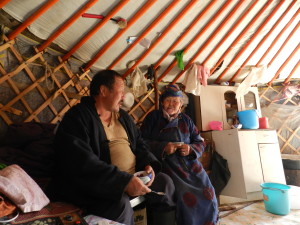No products in the cart.
Eej, a nomadic horsewoman in Mongolia
Early on Saturday morning, March 20, I got a call from Yadmaa, the friend and herder here in Mongolia who helps look after our herd of horses that we use for Stone Horse Expeditions riding trips into the Gorkhi-Terelj National Park and the Khentii Mountains. He was distraught on the phone and could hardly talk. After awhile he finally choked out that his mother had suddenly died the evening before. But that’s all I could learn from him before he hung up. He was taking it quite hard. I found out later she died quite quickly from a stroke while she had ventured into Gachuurt village to do some shopping. There one minute and gone the next.
Tsedev Dadil was 80 years old and had lived her whole life as a true herder, spending most of that lifetime living in a felt ger. Born in Uvs province in the west of Mongolia, where she married and raised 12 children, and then later, much later, moving nearer to Ulaanbaatar with her husband, still living in a ger until she died.
To us, she sort of became known and referred to as eej, pronounced “age”, as in years of life, the Mongolian word for mom or mother.
Referring to her as eej instead of Tsedev sort of came about in a funny way. After several years of being around this family and getting to know each other, I always heard the various brothers talk about eej. “Eej khan uu” or “where is mom?” Or, “eej eren uu”, “mom is coming”. So, in my mind I thought of her as Eej.
Then one day I was sitting in Yadmaa’s ger with the family having a mandatory cup of milk tea and some borsog, a sort of fried bread and I just sorted of blurted out “Eej Khan uu”. Yadmaa, his wife and brothers cracked up. Here I was a foreigner, asking where mom was. They thought it was quite funny. Anyhow, Tsedev, or eej, quickly heard about this and took it to heart. She didn’t see anything unusual about this and claimed she was our Mongolian mother and that we call her Eej. And so it was.
A Traditional Mongolian Herder
Eej was a true herder living in her 4 walled ger by herself, but visited daily by Yadmaa and other family members. People like Eej, people who know the old ways of nomadic herding and know from traditional knowledge how vital it is to the biodiversity of the grasslands are becoming fewer and face enormous challenges. She was never alone and during the summers numerous grand kids visited, staying with her for weeks at a time and keeping her busy making milk tea and other traditional herder fare. Right up until her death just a couple of weeks ago, she kept livestock and tended to her cows and goats every day. On the day she died, Yadmaa moved her ger down to Gachuurt village and other family members, where she would lay in her own ger until burial. Family members and friends from all around came to pay their respects and say their last farewell during the next 3 days. On the 49th day after her death there will be another ceremony to commemorate her life, a tradition here in Mongolia.
While Yadmaa and the rest of the family were in Gachuurt and with funeral arrangements, I stayed with the horses and dogs and took care of things for the few days they were away. It was odd, Eej not around. A bare piece of ground where her ger last stood and her cows and favorite pet goat waiting just outside where the south facing door was located, wondering no doubt where she was and when they would be fed and receive a few soft words of acknowledgement.

Changes in Mongolia
Eej, Tsedev, would have seen enormous changes in Mongolia during her lifetime. She would have grown up where there were at first no cars, no telephones, no roads, just grassland steppe and horses. It was only a few years before she was born that the remnants of the 700 year old “pony express” that had been used since the time of Ginghis Khan to keep news and messages flowing from one end of the empire to the other came to an end. In recent years she did have her own mobile phone though and used it regularly and she made a trip to Korea a year or so ago to visit a son that is working there. Eej was amazed with that, even had her photo taken with a wax Elvis and brought us back some Korean candy.
As I said earlier, she was a true herder and very tough considering the lifestyle. She could walk up to any horse, and I’ve seen her do this, making soothing sounds and just calm them down. She liked the way we treated and worked with our horses in a gentle way. That meant something coming from her. A true herder who never left her roots, refused to live in the city where her kids wanted to have her in an apartment. “The air is too dirty, the city too noisy”.
So, this is a farewell to Eej and the times she lived in, through the communist purges of the old principals to socialist governments, to democracy and an openness that has brought both positive and negative changes. A true nomadic herder to the end and back to the open pristine grasslands from where she came.


